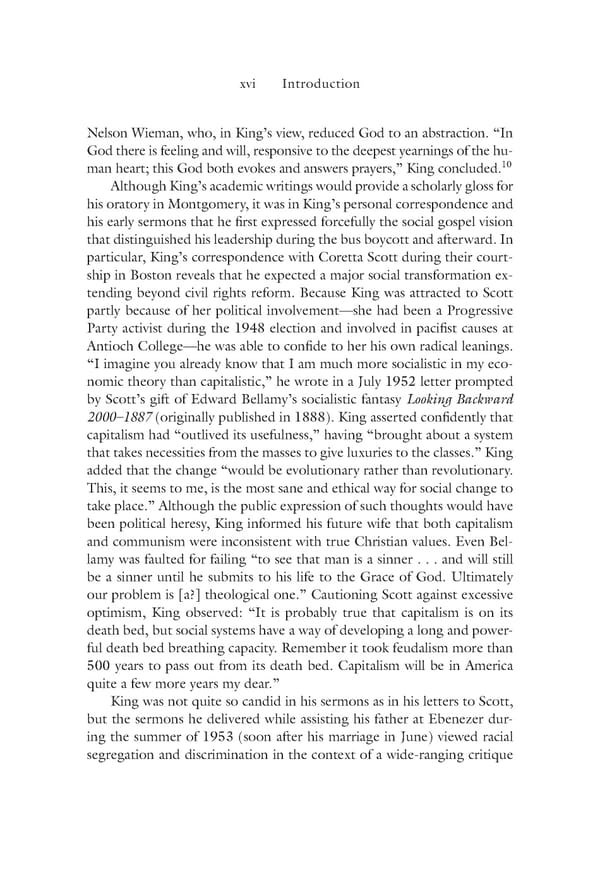xvi Introduction Nelson Wieman, who, in King’s view, reduced God to an abstraction. “In God there is feeling and will, responsive to the deepest yearnings of the hu- 10 man heart; this God both evokes and answers prayers,” King concluded. Although King’s academic writings would provide a scholarly gloss for his oratory in Montgomery, it was in King’s personal correspondence and his early sermons that he first expressed forcefully the social gospel vision that distinguished his leadership during the bus boycott and afterward. In particular, King’s correspondence with Coretta Scott during their court- ship in Boston reveals that he expected a major social transformation ex- tending beyond civil rights reform. Because King was attracted to Scott partly because of her political involvement—she had been a Progressive Party activist during the 1948 election and involved in pacifist causes at Antioch College—he was able to confide to her his own radical leanings. “I imagine you already know that I am much more socialistic in my eco- nomic theory than capitalistic,” he wrote in a July 1952 letter prompted by Scott’s gift of Edward Bellamy’s socialistic fantasy Looking Backward 2000–1887 (originally published in 1888). King asserted confidently that capitalism had “outlived its usefulness,” having “brought about a system that takes necessities from the masses to give luxuries to the classes.” King added that the change “would be evolutionary rather than revolutionary. This, it seems to me, is the most sane and ethical way for social change to take place.” Although the public expression of such thoughts would have been political heresy, King informed his future wife that both capitalism and communism were inconsistent with true Christian values. Even Bel- lamy was faulted for failing “to see that man is a sinner . . . and will still be a sinner until he submits to his life to the Grace of God. Ultimately our problem is [a?] theological one.” Cautioning Scott against excessive optimism, King observed: “It is probably true that capitalism is on its death bed, but social systems have a way of developing a long and power- ful death bed breathing capacity. Remember it took feudalism more than 500 years to pass out from its death bed. Capitalism will be in America quite a few more years my dear.” King was not quite so candid in his sermons as in his letters to Scott, but the sermons he delivered while assisting his father at Ebenezer dur- ing the summer of 1953 (soon after his marriage in June) viewed racial segregation and discrimination in the context of a wide-ranging critique
 Becoming King: Martin Luther King Jr. Page 16 Page 18
Becoming King: Martin Luther King Jr. Page 16 Page 18